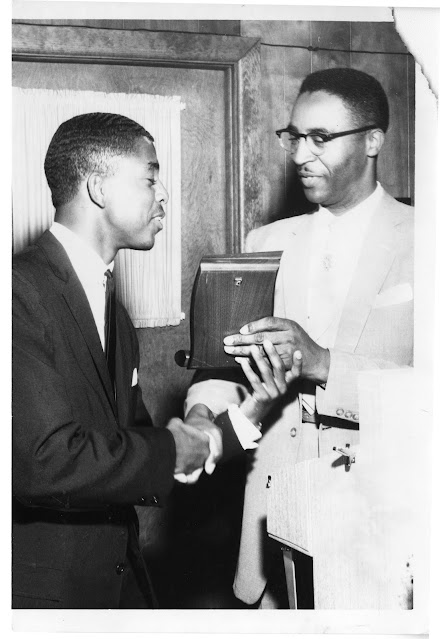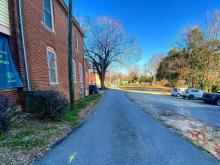Description
Left To Right: Franklin McCain, John Kelly, unidentified woman, unidentified man, Chancellor Edward Fort, Harold Martin, unidentified man, Richard Moore
Hairston, Otis, "Group Photo" (2018). A&T Four: A Closer Look. 20.
https://digital.library.ncat.edu/atfour/20
Description
Three of the A&T Four. Left to Right: David Richmond, Joseph McNeil, Franklin McCain
Hairston, Otis, "Three of the A&T Four" (2018). A&T Four: A Closer Look. 21.
https://digital.library.ncat.edu/atfour/21
James Barnhill was commissioned by A & T University to create these four larger-than-life sculptures out of bronze in 2002. Barnhill is a native of Asheville, North Carolina and has contributed several other sculptures to Greensboro’s public art.
Location: Dowdy Bldg, Greensboro, NC 27401
Photos taken by Lynn Donovan and Action Greensboro
Description
Jibreel Khazan (Ezell Blair), bottom left, in a group photo of student government class representatives. From left to right, standing: Wallace Wortham, Donald McClure, Robert Muldrow, Jerome Baker, Carl Leonard, Edward Murphy, Seated: Ezelle Blair and John Brooks.
Ayantee, "Jibreel Khazan(Ezell Blair) in Group Photo" (1961). A&T Four: A Closer Look. 32.
https://digital.library.ncat.edu/atfour/32
Description
Photo of Jibreel Khazan (Ezell Blair, Jr.) receiving award
North Carolina Agricultural and Technical State University, "Photo of Jibreel Khazan Receiving Award (Ezell Blair, Jr.)" (1961). A&T Four: A Closer Look. 24.
https://digital.library.ncat.edu/atfour/24
Description
Clipping of a photo of Ezell Blair Jr ,. SGA President from the 1962 A&T College Register.
A&T Register, "A&T College Register Photo of Ezell Blair Jr. SGA President" (1962). A&T Four: A Closer Look. 2.
https://digital.library.ncat.edu/atfour/2
















































































































